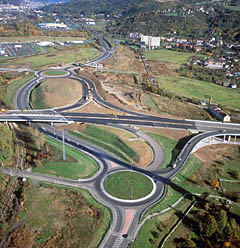
Ecologists welcome the amendment on EIA, while builders and entrepreneurs are not pleased
 |
"The government amendment introduces a restrictive condition for public participation in decision-making about incinerators and chemical plants. However, further attempts at restrictions have been rejected by lawmakers. At the same time, they supported effective access to justice for people. The approved law will thus bring faster and fairer decision-making. However, Czechs have more limited opportunities to comment on large projects than, for example, our neighbors in Slovakia," said Daniel Vondrouš from the association of environmental organizations Green Circle.
This is precisely what bothers Pavel Černohous from the Atelier for the Environment. "Finally, it is being recognized in Czech law that the public can assert the protection of material rights. On the other hand, it is a mistake that the norm does not allow participation for those directly affected by the intent," he stated, adding that the Czech Republic ignores the rights of people and even the Czech constitution.
In contrast, the president of the Association of Entrepreneurs in Construction in the Czech Republic, Václav Matyáš, does not hide his disappointment. "The problem of so-called affected public is pure populism. At every stage of construction, there will be a suspensive effect, which means that anyone can 'throw a wrench' into the works at any stage of construction. This will lead to a situation where nothing will be built at all," he stated.
The head of the development company Ekospol, Evžen Korec, fears the misuse of the law. He claims that investment costs for apartment buildings will rise by millions of crowns, which will consequently increase apartment prices. "A major deficiency is that no significant restriction for starting an investigation procedure has been established for apartment buildings. In the Czech Republic, there is such a crazy bad habit that if someone lives somewhere, they will not tolerate anyone else in their vicinity. Someone will want to build an apartment building and their future potential neighbors will start throwing obstacles in their way and inventing all kinds of hindrances," Korec is concerned, adding that the amendment is another "slap to Czech construction."
According to shadow Environment Minister Kateřina Konečná (Communist Party), the amendment harms the Czech Republic. "It has been shown that the government is completely under the influence of officials from the European Commission, who demand provisions from the Czech Republic that have no support in any European legislation. The adopted version of the draft law contains illegal retroactive provisions and denies the free right of the court to decide on the suspensive effect of a lawsuit. As a result, important infrastructure projects, such as city bypasses that citizens are waiting for, will be further delayed or halted," she stated and called on senators to reject the norm.
The suspensive effect and legal standing of initiatives were also criticized by the Chamber of Commerce of the Czech Republic. "The amendment, based on the demands of the European Commission, introduces liberal conditions for public participation in the process of permitting new constructions. From now on, 'green initiatives' will be able to enter these processes, for which just 200 unverified signatures will suffice for legal standing. A lawsuit filed by such an initiative will have an automatic suspensive effect, which can effectively halt any construction project for years or even decades and significantly threaten the further development of construction in the Czech Republic," warned chamber spokesperson Lenka Vodná.
The new EIA legislation is one of the conditions, alongside the service law, for the European Commission to sign a strategic Partnership Agreement with the Czech Republic. The document outlines how the Czech Republic will draw funds from European funds in the programming period from 2014 to 2020. It was originally supposed to take effect on January 1, 2015, but the House postponed its effectiveness to March 1, 2015.
The English translation is powered by AI tool. Switch to Czech to view the original text source.
0 comments
add comment
Related articles
0
29.10.2017 | Assessing the impact of buildings on the environment may become simpler
0
12.09.2017 | The assessment of the impact of buildings on the environment will be simpler
0
20.07.2017 | The Senate returned the amendment simplifying the EIA process to the Chamber of Deputies
0
27.10.2016 | The Chamber supported the amendment allowing combined proceedings for buildings
0
12.05.2016 | Sobotka: The amendment addressing issues with EIA will be ready by the end of the month
0
01.04.2015 | Today, the amendment to the EIA law comes into effect, and builders are criticizing it
0
11.02.2015 | Parliament limited the misuse of construction delays by lawsuits in the EIA process
0
11.11.2014 | The committee recommended approving the amendment to the EIA with adjustments
0
07.10.2014 | The government amendment on the EIA process faced criticism in the parliamentary committee
0
13.08.2014 | Builders do not like the EIA law, hoping for its amendment
0
04.06.2014 | The builders do not like the changes related to EIA, claiming that it will stop construction projects
0
18.02.2009 | Bursík was outraged by the failure of the government amendment on EIA












